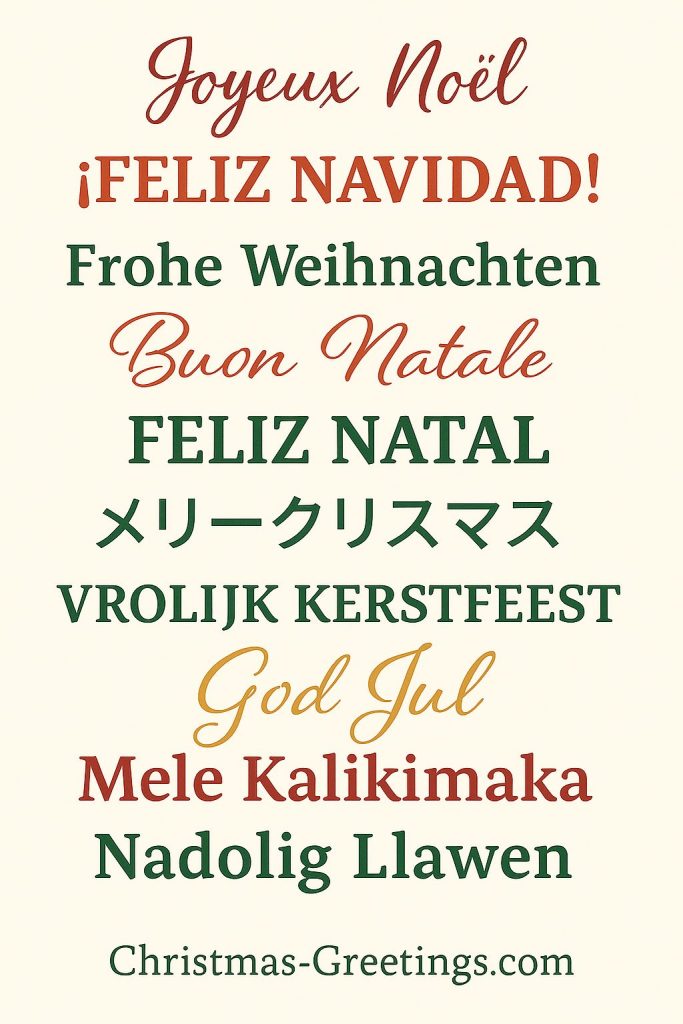Whether you’re sending out cards, planning a globe-trotting holiday email, or just want to impress at the office holiday party, knowing how to say “Merry Christmas” in other languages is a charming way to spread some extra cheer. But be warned – not every translation means exactly what you’d expect, and some countries do Christmas a little differently!
Grab your hot cocoa and let’s travel the world, one holiday greeting at a time.
🎄 French: Joyeux Noël
Pronounced: zhwa-YUH no-EL
This beautiful phrase means “Joyful Christmas,” and it’s the standard greeting in France, parts of Canada, and other French-speaking regions. The French love a festive market, a warm fireplace, and plenty of vin chaud (mulled wine), so saying Joyeux Noël pairs perfectly with all things cozy and twinkly.
🎄 Spanish: ¡Feliz Navidad!
Pronounced: feh-LEEZ nah-vee-DAHD
Thanks to José Feliciano’s iconic tune, this one is a fan favorite. It simply means “Happy Christmas” and is used across Spain, Mexico, and most Latin American countries. Fun fact: In many Spanish-speaking cultures, the big celebration actually happens on Christmas Eve (Nochebuena), with midnight feasts and fireworks galore.
🎄 German: Frohe Weihnachten
Pronounced: FROH-uh VINE-ahk-ten
This one means “Happy Holy Nights,” which makes sense because in Germany, the season is steeped in tradition. From St. Nicholas Day on December 6 to the charming Christkindl markets, there’s a lot more going on than just Christmas Day. If you want to be extra authentic, add a cheerful “und ein gutes neues Jahr” (and a Happy New Year).
🎄 Italian: Buon Natale
Pronounced: Bwohn nah-TAH-leh
This one’s a favorite just for how melodic it sounds. It means “Good Christmas,” and you’ll hear it all over Italy as people exchange baci (kisses), panettone, and festive cheer. Italians often celebrate with a Feast of the Seven Fishes on Christmas Eve – a tradition worth adopting, even if just for the seafood!
🎄 Portuguese: Feliz Natal
Pronounced: feh-LEEZ nah-TAHL
Spoken in Portugal and Brazil, this phrase is close to the Spanish version, but with its own twist. In Brazil, Christmas falls in the summer, so you might be saying Feliz Natal while wearing flip-flops and sipping something cold under a palm tree.
🎄 Japanese: メリークリスマス (Merī Kurisumasu)
Pronounced: meh-ree koo-ree-soo-mah-su
Yes, it’s just a Japanese take on the English phrase, and it’s widely used in Japan, where Christmas is more about couples and romantic lights than family traditions. Think Valentine’s Day with a sprinkle of Santa.
🎄 Dutch: Vrolijk Kerstfeest
Pronounced: VROH-like KERST-feest
This phrase translates to “Joyful Christmas Celebration,” and it fits the Netherlands’ mix of fun and festivity. Kids get gifts from Sinterklaas on December 5, but you can still say Vrolijk Kerstfeest on the 25th!
🎄 Swedish: God Jul
Pronounced: goo yool
Short and sweet, it means “Good Yule” – a nod to the ancient winter solstice festival that predates Christianity. In Sweden, Christmas is all about candles, glögg (spiced wine), and one seriously adorable goat made of straw.
🎄 Hawaiian: Mele Kalikimaka
Pronounced: meh-leh kah-lee-kee-mah-kah
A festive favorite made famous by Bing Crosby, this phrase is a phonetic translation of “Merry Christmas” into Hawaiian sounds. In the islands, Christmas often includes surfing Santas and hula-themed holiday parades. Aloha, indeed!
🎄 Welsh: Nadolig Llawen
Pronounced: nah-DOH-lig HLAH-wen
Wales brings the magic with this lovely phrase meaning “Joyful Christmas.” Welsh carols are rich and hauntingly beautiful, so try singing this one at your next gathering – if you can get the pronunciation right!
Final Thoughts
No matter where you are in the world, the spirit of the season shines through in every language. Whether you say Merry Christmas, Feliz Navidad, or God Jul, the message is the same: warmth, kindness, and a little sparkle of joy.
Why not try writing your cards or digital greetings with a festive phrase from another culture this year? It’s a small gesture that carries big holiday heart.
Shareable version for Pinterest or socials:

